6 Best Language Learning Apps: Reviews, Pricing, Features
In today’s world, it’s safe to say that almost everyone is glued to their phones. But what if you could turn that screen time into something productive? If you’re looking to learn a new language, using the best language learning software can be a great way to get started.
As someone currently learning Spanish, I’ve explored some of the best apps for learning languages, and I’ve found that the right tools can help you build a solid foundation and stay motivated. In this blog, I’ll share some of the top options to help you find the best app to learn another language based on your goals and learning style.
Key Takeaways: The Best Language Learning Apps & Software
- 📌 Best Language Learning Apps for Every Need: Duolingo is a good free option for beginners and is often considered the most popular language learning app for foundational skills. Babbel offers structured lessons with grammar, Busuu has AI-powered feedback, and FindTutors connects you with private tutors for real conversation practice.
- 📌 Free vs. Paid Language Apps: What’s Worth It? Most apps provide limited free lessons, but Babbel Live and Busuu AI tools require a premium plan. If you want flexible learning without a subscription, FindTutors lets you set your own budget.
- 📌 The Best App for Your Learning Style: Memrise and Busuu use native speaker videos, Babbel teaches practical conversations, and FindTutors offers 1-on-1 private lessons for real-life fluency.
- 📌 Which Language App is Best for Fluency? Apps like Duolingo and Memrise help build vocabulary, but real fluency comes from speaking. Private tutors on FindTutors let you practise speaking and listening with native speakers for faster progress.
- 📌 Is a Private Tutor Better Than an App? Apps are great for practice, but private tutors provide personalised learning. Apps that offer one-on-one learning include FindTutors and Babel Live.
The Best Language Learning Software: What to Look For
When choosing the best language learning software, consider these key factors:
- Your Current Level: Are you a beginner or already at an intermediate level? Understanding your current level helps tailor the learning process to your needs.
-
- For example, as an intermediate Spanish learner, my main goal was to practise speaking with a native, so private tutoring was the best option for me. However, when I was a beginner, I used apps like Duolingo to build my vocabulary.
- Your Learning Style: Do you learn best through visuals, listening, or interactive exercises? Some apps focus more on vocabulary, others on grammar, and some prioritise speaking. Choosing the right learning tool can significantly impact your motivation and progress. Knowing which skill you want to improve will help you choose the right platform.
- Your Budget: Are you looking for free software for daily practice, or are you willing to invest in a paid plan? If you’re open to paying, it’s important to consider your budget and whether a subscription or pay-per-lesson model works best for you.
6 Best Apps for Learning Languages
After testing out different apps myself (and convincing my friends to do the same), I’ve found that not all language learning apps are created equal. Some are great for picking up vocabulary, while others help with speaking, and a few are just overall has the same features that could be useful for beginners but that’s basically it.
If you’re looking to learn a language, here are some of my favorite language learning apps that have proven effective for different aspects of language acquisition:
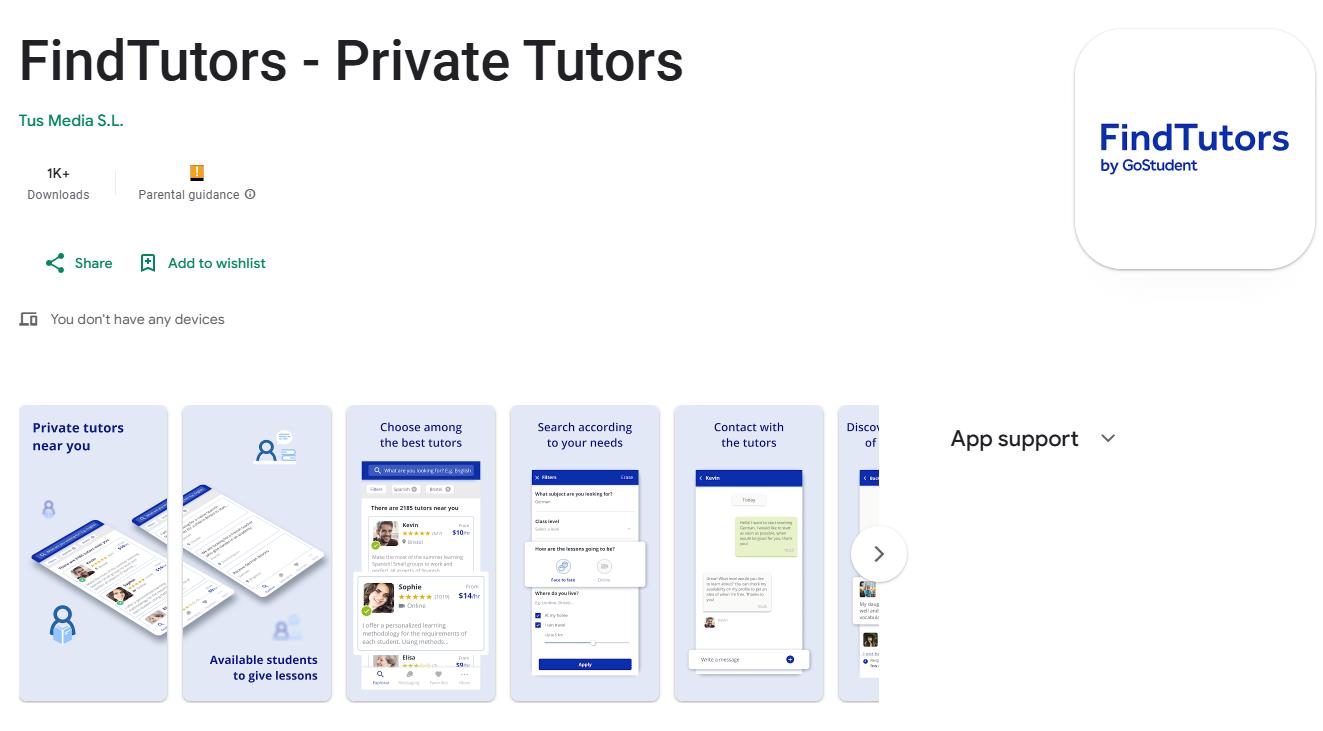
1. FindTutors: Best for Private Lessons with Real Tutors
Languages offered: FindTutors connects learners with real tutors for personalised lessons in over 40 languages.
Unlike traditional language learning apps, FindTutors app doesn’t rely on AI-generated exercises or repetitive drills. Instead, it connects you with real tutors who provide live, one-on-one lessons, ensuring you get tailored feedback and real conversation practice.
This approach is particularly effective for those who want to develop speaking confidence, pronunciation, and grammar skills in a natural way, something pre-made exercises just can’t offer.
If you’re serious about learning a language properly, FindTutors is one of the best choices because you get to interact with native or experienced tutors, ask questions in real time, and receive structured lessons tailored to your level and goals.
Whether you're preparing for an exam, moving abroad, or just want to have fluent conversations, FindTutors helps you progress faster and more effectively than self-paced apps.
StudentPass: Unlimited Tutor Access
One of the biggest advantages of FindTutors is the StudentPass, which allows learners to contact unlimited tutors for a fee of £19/month. Unlike platforms where you have to message tutors one by one and hope for a response, StudentPass speeds up the process, letting you browse and book lessons easily.
This is especially useful for language learners, as you can find the best tutor for your needs without additional costs. FindTutors is perfect for those who want a more structured, interactive way to learn a language, rather than just passively memorising words.
Flexible Pricing & StudentPass
FindTutors offers two options for students to connect with tutors:
- Basic Class Request (£9.90 one-time fee): Publish your ad and contact only tutors who express interest. If you receive fewer than 15 contacts, you get a refund.
- StudentPass (£19/month, discounted from £39): Your ad is prioritised, and you can contact unlimited tutors. If you receive fewer than 10 contacts, you get a refund.
💰 Lesson prices vary based on the tutor's experience, typically ranging from £10-40 per hour. Additionally, most tutors offer the first lesson for free, allowing you to find the best match before committing to paid lessons.
How Does FindTutors Compare to Other Apps?
📌 Babbel Live vs FindTutors: Babbel Live requires a fixed monthly subscription (£84+), offering scheduled group lessons or private sessions at a higher cost. Tutors are assigned, limiting your choice. In contrast, FindTutors gives you full flexibility, you pay per lesson, choose your tutor, and set your own schedule.
For easier student-tutor connections, FindTutors offers StudentPass (£19/month, discounted from £39), allowing unlimited tutor contacts. Plus, most tutors offer a free first lesson, making it a more budget-friendly and personalised option for language learners.
📌 AI vs Real Interaction: Apps like Duolingo and Memrise use AI chatbots and recorded phrases, but nothing beats real human interaction. FindTutors allows you to practise speaking with a real tutor who gives instant feedback on your pronunciation, grammar, and fluency.
📌 Flexible Learning: While apps follow a fixed course structure, tutors on FindTutors gives you full control over your learning. Need to prepare for an exam? Want to focus on conversational skills? Your tutor adapts to your specific goals, rather than a one-sie-fits-all course.
2. GoStudent: Structured Tutoring with Popular Language Options
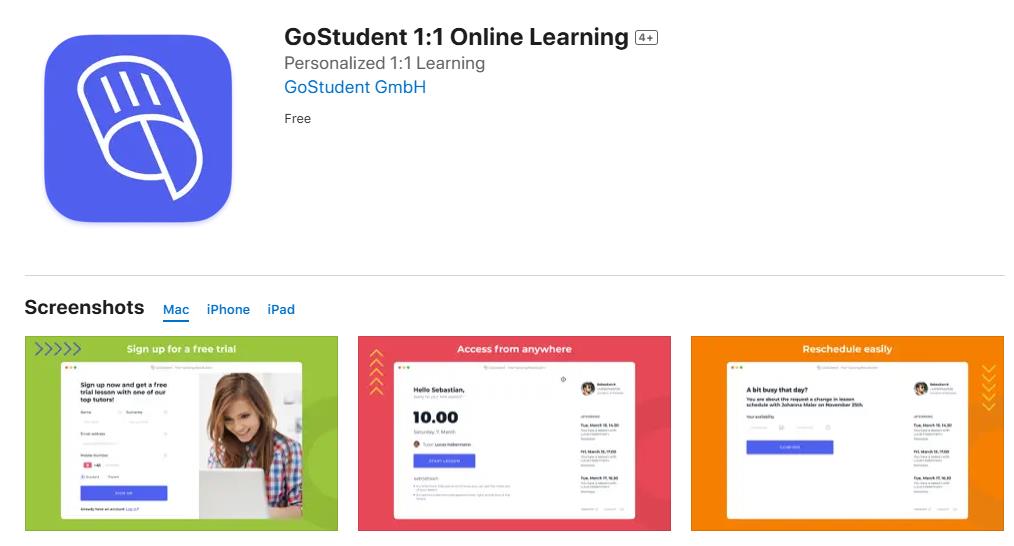
Languages offered: While GoStudent primarily focuses on school subjects, it also provides tutoring for popular languages like Spanish, French, and German.
GoStudent offers one-on-one, 50-minute private lessons tailored to each student’s needs. Unlike self-paced language apps, lessons follow a structured learning plan, making it a great choice for students preparing for exams or long-term fluency.
GoStudent Pricing & Learning Tools
- Free trial lesson available
- From £21.99 per lesson (prices decrease when booking more lessons)
- 50-minute private lessons with a dedicated tutor
- Full access to GoStudent’s learning tools and technology
GoStudent app is great for students looking for structured, school-focused tutoring with the option to learn a few key languages.

3. Duolingo: Ideal for Beginners
⭐Duolingo App Ratings:
- Google Play: 4.6★ (31M reviews)
- App Store: 4.8★ (3.8M ratings)
Languages offered: 40
Super Duolingo plan includes:
- Unlimited Hearts
- Skills practice
- Mistakes review
- Free challenge entry
- No ads
Let’s be real, Duolingo is everywhere. The app makes learning addictive with streaks, badges, and that slightly aggressive owl reminding you to practise. It’s ideal for building vocabulary and basic grammar, but if you’re aiming for real conversations or grammar explanations, you’ll need more than just Duolingo’s exercises.
Duolingo is good if you’re a complete beginner, because it starts directly with sentences. It forces you to learn new vocabulary and sentence structure by repeating the same things multiple times. But at the same time, even though it is motivating to have the gamification, it can easily get boring after a while.
For me, it is the repetitive sentences that you keep learning without grammar explanations and you probably won’t hear or use them in real-life.
The biggest advantage of Duolingo is that the core learning content is completely free, making it one of the best free language learning apps out there. However, the free version comes with ads and limited mistakes review, and if you run out of "hearts," you have to wait or practise old lessons before continuing.
Duolingo is the most popular free language learning app for most people because it offers a solid introduction to a new language without requiring a paid plan.
💰Duolingo Pricing (UK)
- Super Duolingo: £4.99/month or £48/year
- Family Plan (up to 6 people): £89.99/year (equivalent to £14.99 per person, or £1.24/month)
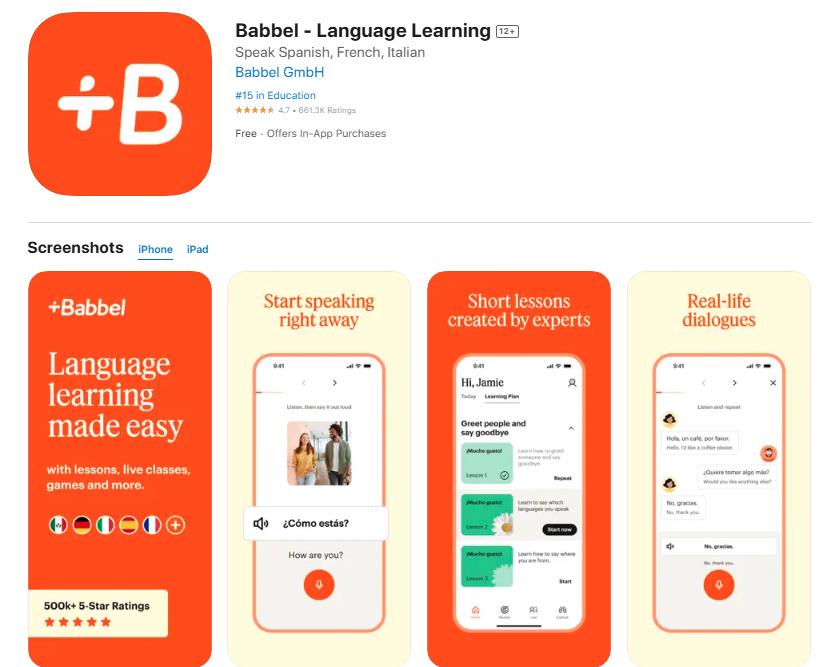
4. Babbel: Ideal for Structured Lessons
⭐ Babbel App Ratings:
- Google Play: 4.6★ (1.06M reviews)
- App Store: 4.7★ (661.6K ratings)
Languages offered: 14
- Free trial: 7 days
- Free plan includes: Limited access to the first lesson in each course
Babbel App includes:
- Step-by-step structured lessons
- Grammar explanations and vocabulary practice
- AI conversation partner & Guided Conversations
- Grammar Guide & Audio Recap
- Personalised learning plan based on a level test
If you like learning step by step, Babbel does a solid job. The lessons feel structured, focusing on practical conversations rather than random phrases. I found it especially useful for grammar. Keep in mind that it is seen better for some languages (like Spanish and French) than others.
Before starting, you choose whether you’re a beginner, intermediate, or advanced learner, and Babbel gives you a short level test. Based on the results, it immediately takes you to a lesson. Babbel also offers more challenging content for advanced learners looking to refine their skills.
The lessons feels more challenging than other apps (something I personally like). At the end of each lesson, there’s a longer review exercise, and you also get a section to track mistakes and review what you’ve learned. Plus, Babbel creates a personalised learning plan for you right after the test.
Unfortunately, Babbel only lets you access the first lesson for free, so if you want to progress, you’ll need a subscription. The Babbel App subscription includes full access to interactive courses, while Babbel Live offers live group or private lessons with certified teachers. The live feature is a good way to practise speaking, but it’s quite expensive compared to other apps.
One of Babbel’s standout features is Babbel Live, which allows you to join real-time lessons with certified tutors. Instead of traditional one-on-one tutoring, Babbel Live offers two options:
-
Group Classes Only: You’ll learn in a small group of up to six students. Lessons cover a range of topics (e.g., “Talk about your childhood memories”), and you can join sessions at different levels.
-
Private & Group Classes: Includes everything from the group plan, plus private 1-on-1 sessions with tutors for more personalised learning.
💰Babbel Pricing
Babbel App (without Live) – Access to All Languages
- 3 months: €11.99/month (€35.97 total) (~£30.00)
- 6 months: €8.99/month (€53.94 total, discounted from €71.94) (~£45.00)
- 12 months: €5.99/month (€71.88 total, discounted from €143.88) (~£60.00)
- Lifetime Access: €299.99 (discounted from €599.99, one-time payment) (~£255.00)
Babbel Live (with Tutors) – Unlimited Lessons
- Unlimited Group Classes Only: €99/month (~£84.00)
- Unlimited Private & Group Classes: €149/month (~£126.00)
I think it is a good idea for real practice, but the pricing for Babbel Live is on the higher side. The flexibility to choose topics and levels is a big plus, though, making it feel like a personalised classroom experience.
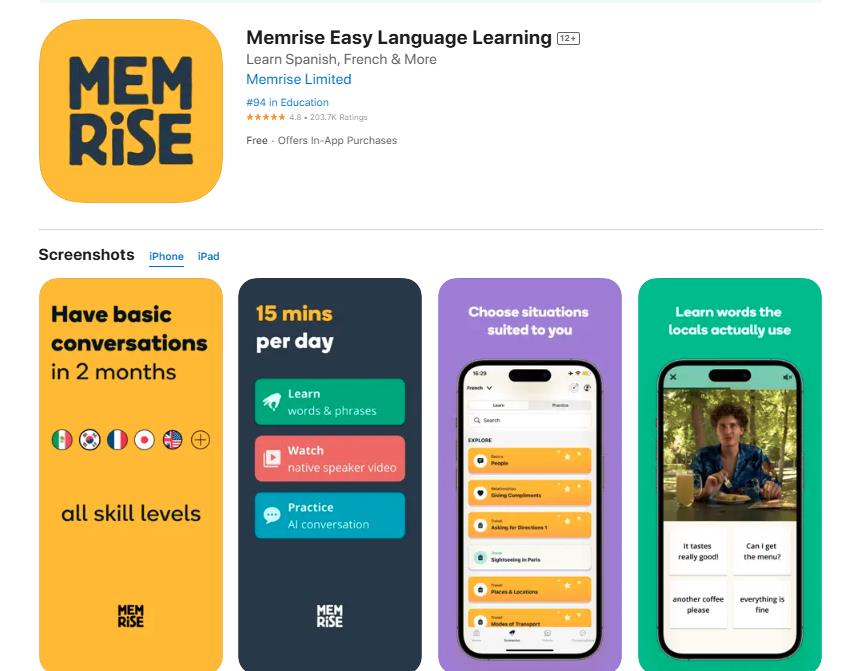
5. Memrise: Good for Learning Real-Life Phrases
⭐ Memrise App Ratings:
- Google Play: 4.6★ (1.55M reviews)
- App Store: 4.7★ (87.8K ratings)
Languages offered: 39
Free plan includes: Limited access to videos and conversations
Memrise Pro includes:
- No ads
- AI features
- Unlock all videos
- Full vocab lessons
- Unlimited conversation practice
Memrise is underrated! It’s one of the few apps that uses videos of native speakers, so you hear real pronunciation and natural expressions instead of robotic voices. If you want to pick up useful phrases quickly, this is a solid choice.
One thing I really liked about Memrise is that you can choose the dialect you want to learn. For example, in Spanish, you can pick Spain or Mexico, in Portuguese, you can choose Portugal or Brazil, and in Japanese, you can decide whether to learn with or without script. Duolingo doesn’t offer this, so it’s a good feature if you want to focus on a specific region.
Memrise focuses on real-life scenarios, teaching you useful phrases while showing a native speaker saying them in a video. This immersion in the target language helps learners pick up natural expressions and pronunciation. After each lesson, you get a summary of what you’ve learned, plus a review section to go over old phrases. Like Duolingo, it has streaks to keep you motivated, but the repetition can sometimes feel boring, though, let’s be honest, that’s often needed when learning a language.
The free plan gives you limited access to videos and conversation exercises (like “ordering coffee” or “asking for a wine recommendation”). These are useful if you’re mainly learning for real-life interactions, but you’ll need the Pro version for full access.
💰Memrise Pricing
- Monthly: €29.99 (~£24.85)
- Yearly: €75.99 (~£63.00, with frequent discounts—mine was 21% off)
- Lifetime: €204,99 (~£169.95)
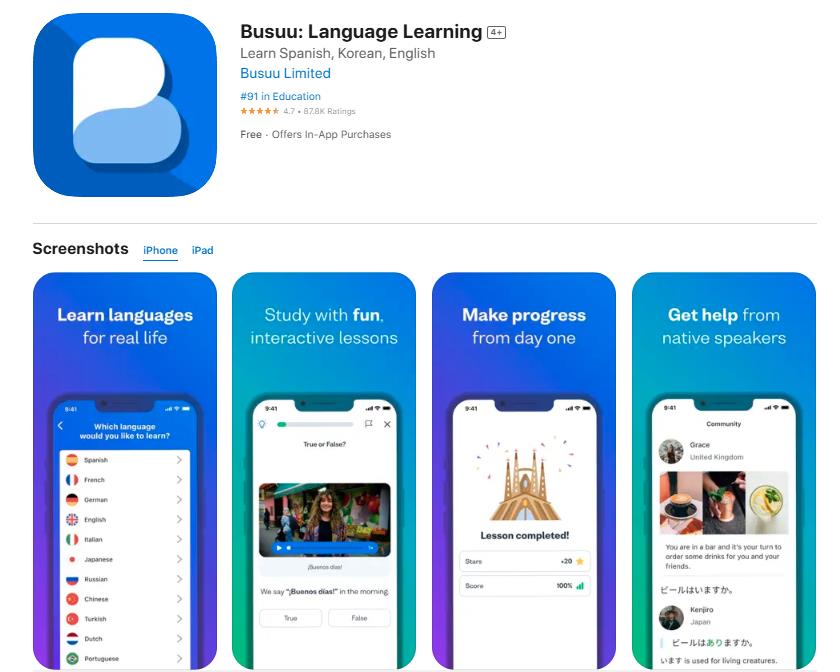
6. Busuu: Good for Community Learning
⭐Busuu App Rating
- 4.6 (892K reviews on Google Play)
- 4.7 (87.8K ratings on Apple App Store)
Languages offered: 14
Free trial: 7 days
Busuu has one of the most accurate level tests I’ve seen. You start by choosing between beginner or some knowledge, and the test actually got my Spanish level spot on, which no other app has done so far. Lessons are short and structured, and like Memrise, you get native speaker videos, but there are fewer videos and shorter clips compared to Memrise. In the free plan, you have to watch ads to unlock lessons.
The Community section is where Busuu really stands out. You can upload a text or voice recording based on a topic they suggest (or your own) and get corrections from native speakers. At the same time, you can review other learners’ submissions in the languages you already know.
For example, I was asked to describe a picture in Spanish, and in return, I could check and correct messages from people learning Turkish or English. You can also add friends and interact, making it feel like an actual language-learning community instead of just an app.
Busuu also offers AI Conversations (Premium feature), where you record yourself speaking on a given topic and get AI-generated feedback. You can try this for two lessons during the free trial, but after that, it’s behind a paywall.
The Review section is well-organised, separating vocab and grammar, so you can go back and focus on weak spots. And like Duolingo, Busuu keeps you motivated with streaks.
💰Busuu Pricing
- 12 months: €83.88 (€6.99/month) – 50% discount (~£69.55 / £5.80 per month)
- 6 months: €59.94 (€9.99/month) – 29% discount (~£50.23 / £8.37 per month)
- 1 month: €13.98 (~£11.59)
Busuu is one of the good language learning apps if you want real interaction with native speakers, but most of its top features (like AI Conversations and grammar review) are unfortunately unlocks with the Premium. The free version is good, but if you’re looking for structured lessons with detailed feedback, you’ll have to pay.
Language Learning Apps Compared: Free vs Paid Features & Pricing Breakdown
Language Learning Apps Compared: Free vs Paid Features & Pricing Breakdown
| App | Free Plan Includes | Paid Plan Includes | Pricing (Monthly/Annual/Lifetime) |
|---|---|---|---|
| FindTutors | Free tutor browsing, message tutors, some offer free trial lessons | Basic Class Request (£9.90/month) to post an ad & receive tutor responses, StudentPass (£19/month) for unlimited tutor contacts | Lesson prices set by tutors, usually from £10-£40 per lesson |
| GoStudent | Free trial lesson | One-on-one tutoring, structured lessons, full access to learning tools | From £21.99 per lesson (discounts for bulk bookings) |
| Duolingo | Full course access with ads, limited hearts, no mistake review | No ads, unlimited hearts, mistake review, offline lessons, family plan | £4.99/month, £48/year, £89.99/year (family plan, up to 6 people) |
| Babbel | First lesson free, structured learning, no AI tools | Full access, grammar explanations, AI conversation, offline mode | £10.29/month, £46.32/6 months, £61.56/year, £257.88 lifetime |
| Babbel Live | 7-day free trial | Unlimited live tutor-led group/private classes | £84.65/month (group), £127.42/month (group + private) |
| Memrise | Limited videos, limited conversation practice | Full access to native speaker videos, AI chat, offline mode | £25.99/month, £65.99/year (with discounts), £177.99 lifetime |
| Busuu | Full course access with ads, community corrections | AI pronunciation feedback, offline mode, grammar review, no ads | £11.99/month, £49.99/6 months, £69.99/year |
Choosing the right language-learning software depends on your goals, budget, and preferred learning style. If you're after a fun and gamified experience, Duolingo keeps things engaging, but it lacks deep grammar explanations.
Babbel offers structured lessons and live classes, but the cost for tutoring is high. Memrise and Busuu focus on real-life conversations with native speaker videos, while FindTutors gives you the most flexibility, letting you work with private tutors at your own budget.
Ultimately, the best way to learn a language is the one that keeps you motivated. Whether that's through apps, live lessons, or one-on-one tutoring.
Disclaimer: This blog is based on my personal research and experience with these apps in 2025. Prices and features may vary depending on your location, currency, or seasonal promotions. Always check the official website or App Store & Google Play for the most up-to-date pricing and offers.


